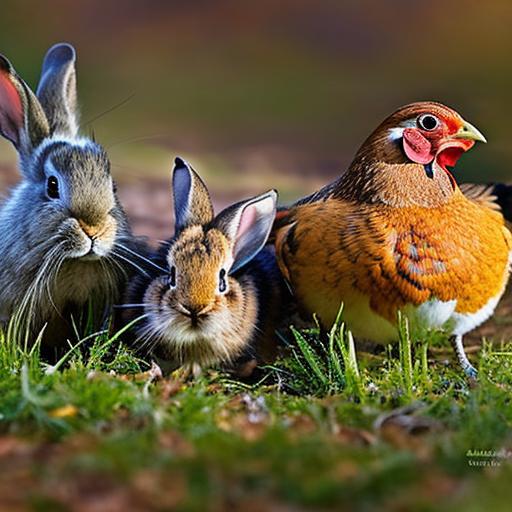Have you ever considered keeping chickens and bunnies together? It may seem like an odd pairing, but these two animals can actually coexist peacefully and even benefit from each other’s presence. Chickens and bunnies can provide companionship for each other, with the chickens offering protection and the bunnies helping to keep the chicken coop clean. In this article, we will explore the benefits of keeping chickens and bunnies together, as well as provide tips on how to create a safe and secure environment for both animals.
Key Takeaways
- Keeping chickens and bunnies together can be a great way to save space and enjoy the benefits of both animals.
- Chickens and bunnies can provide companionship and help control pests in the garden.
- Understanding the natural behavior of chickens and bunnies is important for creating a safe and secure environment for both animals.
- Feeding and caring for chickens and bunnies together requires careful consideration of their dietary needs and potential health concerns.
- Training and introducing new animals to an existing group can help ensure peaceful coexistence.
Benefits of keeping chickens and bunnies together
One of the main benefits of keeping chickens and bunnies together is the companionship they can provide for each other. Chickens are social animals and enjoy being part of a flock. They thrive when they have other chickens to interact with, and having a bunny as a companion can help fulfill their social needs. Bunnies, on the other hand, are prey animals and can be easily frightened. Having chickens around can help provide a sense of security for them.
Another benefit of keeping chickens and bunnies together is that bunnies can help keep the chicken coop clean. Bunnies are natural grazers and will happily eat leftover food and droppings from the chickens. This can help reduce the amount of waste in the coop and create a cleaner environment for both animals. Additionally, bunnies produce nutrient-rich manure that can be used as fertilizer for the garden.
Chickens can also help protect bunnies from predators. Chickens are known to be territorial and will often sound an alarm if they sense danger. This can alert the bunnies to potential threats and give them time to find safety. The presence of chickens can deter predators from approaching the bunny hutch, providing an added layer of protection for the bunnies.
Understanding the behavior of chickens and bunnies
In order to successfully keep chickens and bunnies together, it’s important to understand the natural behaviors of both animals. Chickens are social animals and enjoy being part of a flock. They have a pecking order and establish a hierarchy within the group. It’s important to provide enough space for the chickens to move around and establish their own territories.
Bunnies, on the other hand, are prey animals and can be easily frightened. They have a strong flight response and may become stressed if they feel threatened. It’s important to provide hiding places for the bunnies to retreat to if they feel scared or overwhelmed. This can be as simple as providing boxes or tunnels for them to hide in.
Creating a safe and secure environment for both animals
Creating a safe and secure environment is crucial when keeping chickens and bunnies together. Both animals need separate areas to retreat to if needed. This can be achieved by providing separate coops or hutches for each animal, with a shared outdoor space where they can interact.
It’s also important to make sure that the coop and bunny hutch are secure from predators. This means using sturdy materials and ensuring that there are no gaps or holes that predators can squeeze through. Additionally, it’s important to provide plenty of space for both animals to move around and exercise. This can help prevent boredom and reduce the risk of aggression.
Feeding and caring for chickens and bunnies together
When it comes to feeding chickens and bunnies together, it’s important to feed them separately to avoid competition for food. Chickens have different dietary needs than bunnies, so it’s best to provide them with their own feeders. Additionally, it’s important to provide fresh water and clean bedding for both animals.
Regularly checking for signs of illness or injury is also important when caring for chickens and bunnies together. Chickens can carry diseases that can be harmful to bunnies, so it’s important to monitor their health and seek veterinary care if needed. Bunnies can also be injured by the sharp claws of chickens, so it’s important to keep an eye out for any signs of aggression or bullying.
Potential health concerns when keeping chickens and bunnies together

While keeping chickens and bunnies together can be a rewarding experience, there are some potential health concerns to be aware of. Chickens can carry diseases such as coccidiosis and salmonella, which can be harmful to bunnies. It’s important to practice good hygiene and regularly clean the coop and bunny hutch to reduce the risk of disease transmission.
Bunnies can also be injured by the sharp claws of chickens, especially if they are not properly introduced or supervised. It’s important to monitor their interactions closely and intervene if any aggression or bullying occurs. Regular veterinary check-ups are also important to ensure that both animals are healthy and free from any potential health issues.
Training chickens and bunnies to coexist peacefully
Training chickens and bunnies to coexist peacefully requires patience and consistency. It’s important to introduce them slowly and gradually, allowing them to get used to each other’s presence. Positive reinforcement can be used to reward good behavior, such as calm interactions or sharing space without aggression.
Supervising interactions between the two animals is crucial until they are comfortable with each other. This can help prevent any potential injuries or stress. It’s also important to provide plenty of hiding places for the bunnies to retreat to if they feel scared or overwhelmed.
Tips for introducing new chickens or bunnies to an existing group
Introducing new chickens or bunnies to an existing group requires careful planning and consideration. It’s best to quarantine new animals for a period of time before introducing them to the group. This can help prevent the spread of any potential diseases and allow the new animals to acclimate to their new environment.
When introducing new animals, it’s important to do so gradually and in a neutral area. This can help reduce any potential territorial behavior or aggression. It’s also important to monitor interactions closely to ensure that everyone is getting along. If any aggression or bullying occurs, it may be necessary to separate the animals and try again at a later time.
Common misconceptions about keeping chickens and bunnies together
There are some common misconceptions about keeping chickens and bunnies together that are not necessarily true. One misconception is that chickens will harm bunnies. While it’s true that chickens can be territorial, with proper training and supervision, they can coexist peacefully with bunnies.
Another misconception is that bunnies will be scared of chickens. While bunnies are prey animals and can be easily frightened, with proper introductions and a safe environment, they can feel secure around chickens. It’s important to provide hiding places for the bunnies to retreat to if they feel scared or overwhelmed.
Is keeping chickens and bunnies together right for you?
Keeping chickens and bunnies together can be a rewarding experience for both animals and their owners. They can provide companionship for each other, with the chickens offering protection and the bunnies helping to keep the chicken coop clean. However, it’s important to carefully consider the needs of both animals and ensure they can coexist safely and peacefully.
Understanding the behavior of chickens and bunnies, creating a safe and secure environment, and providing proper care and training are all essential when keeping these animals together. With proper planning and care, chickens and bunnies can live harmoniously and enjoy each other’s company.
If you’re considering keeping chickens and bunnies together, it’s important to understand the dynamics and requirements of both animals. While they can coexist peacefully, there are certain considerations to keep in mind. One helpful resource to explore is an article on Poultry Wizard titled “Can You Keep Chickens and Bunnies Together?” This article provides valuable insights into creating a harmonious living environment for these two species. From tips on coop design, insulation techniques, to repurposing sheds into chicken coops, this article covers it all. To learn more about this topic, check out the article here.
FAQs
What are the benefits of keeping chickens and bunnies together?
There are several benefits of keeping chickens and bunnies together. They can help each other stay warm during cold weather, and their manure can be used as fertilizer for plants. Additionally, they can provide companionship for each other.
Is it safe to keep chickens and bunnies together?
Yes, it is generally safe to keep chickens and bunnies together as long as they are properly introduced and supervised. However, it is important to note that chickens may peck at bunnies, which can cause injury or stress.
What should I consider before keeping chickens and bunnies together?
Before keeping chickens and bunnies together, you should consider the size of your enclosure, the temperament of your animals, and their individual needs. Additionally, you should ensure that they have separate areas for food and water to prevent competition and potential aggression.
What should I feed my chickens and bunnies?
Chickens and bunnies have different dietary needs, so it is important to provide them with separate food and water sources. Chickens require a diet high in protein, while bunnies require a diet high in fiber. Consult with a veterinarian or animal nutritionist for specific dietary recommendations.
What are some potential problems with keeping chickens and bunnies together?
Some potential problems with keeping chickens and bunnies together include aggression between animals, competition for resources, and the spread of disease. It is important to monitor your animals closely and address any issues that arise promptly.
Meet Walter, the feathered-friend fanatic of Florida! Nestled in the sunshine state, Walter struts through life with his feathered companions, clucking his way to happiness. With a coop that’s fancier than a five-star hotel, he’s the Don Juan of the chicken world. When he’s not teaching his hens to do the cha-cha, you’ll find him in a heated debate with his prized rooster, Sir Clucks-a-Lot. Walter’s poultry passion is no yolk; he’s the sunny-side-up guy you never knew you needed in your flock of friends!







